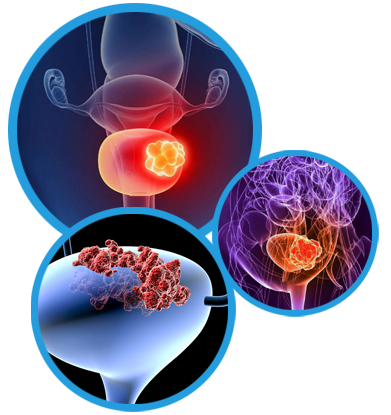
What Is Bladder Cancer?
Bladder cancer is a type of cancer that begins in the cells lining the bladder, the organ responsible for storing urine.
It is one of the most common cancers of the urinary tract, affecting both men and women.
Bladder cancer can vary in severity, with some cases being non-invasive and others progressing to invade deeper layers of the bladder wall or spread to other parts of the body.
It is one of the most common cancers of the urinary tract, affecting both men and women.
Bladder cancer can vary in severity, with some cases being non-invasive and others progressing to invade deeper layers of the bladder wall or spread to other parts of the body.
Symptoms of Bladder Cancer
Symptoms of bladder cancer may include
- Blood in the urine (hematuria), which may be visible or only detected under a microscope
- Frequent urination
- Painful urination
- Urinary urgency
- Lower back pain or pelvic pain
- Feeling the need to urinate without being able to pass much urine
- Urinary tract infections (UTIs) that recur or do not respond to treatment
Causes of Bladder Cancer
- The exact cause of bladder cancer is often unknown, but certain risk factors may increase the likelihood of developing the disease.
- Smoking is the most significant risk factor for bladder cancer, accounting for a large portion of cases.
- Other risk factors include exposure to certain chemicals or carcinogens in the workplace, such as arsenic, aromatic amines, and polycyclic aromatic hydrocarbons (PAHs).
- Chronic bladder inflammation or infections, as well as certain genetic factors, may also contribute to the development of bladder cancer.
Types of Bladder Cancer
1. Transitional Cell Carcinoma (TCC):
- Most Common: This type starts in the inner lining of the bladder, called the transitional cells.
- Symptoms: Blood in urine, frequent urination, and pain during urination.
2. Squamous Cell Carcinoma:
- Less Common: Often develops after long-term bladder infections or irritation.
- Symptoms: Similar to TCC, but more aggressive.
3. Adenocarcinoma:
- Rare: Originates from glandular cells in the bladder.
- Symptoms: Blood in urine, abdominal pain, and weight loss.
Prevention of Bladder Cancer
Preventing bladder cancer involves making lifestyle changes and being aware of risk factors:
- Quit Smoking: Smoking is a major risk factor for bladder cancer. Stopping smoking can significantly reduce your risk.
- Stay Hydrated: Drinking plenty of water helps flush toxins from your bladder.
- Avoid Chemical Exposure: If you work with chemicals, use protective gear and follow safety guidelines.
- Eat a Healthy Diet: A diet rich in fruits and vegetables can help reduce your risk.
How Bladder Cancer Diagnosis
- Diagnosis of bladder cancer typically involves a combination of medical history, physical examination, and diagnostic tests.
- Common diagnostic tests for bladder cancer include urine tests to detect blood or abnormal cells in the urine, imaging tests such as ultrasound, CT scan, or MRI, and cystoscopy, a procedure in which a thin, flexible tube with a camera is inserted into the bladder to visualize any abnormalities.
- If a suspicious lesion is found during cystoscopy, a biopsy may be performed to obtain a tissue sample for examination under a microscope to confirm the presence of cancerous cells.
Treatment of Bladder Cancer
Treatment depends on the stage and type of bladder cancer:
1. Surgery:
- Transurethral Resection (TURBT): Removes tumors from the bladder.
- Cystectomy: Partial or total removal of the bladder, depending on the severity.
2. Chemotherapy:
- Intravesical Chemotherapy: Delivered directly into the bladder.
- Systemic Chemotherapy: Affects the whole body to target cancer cells.
3. Immunotherapy:
- BCG Therapy: Uses bacteria to stimulate the immune system to attack cancer cells in the bladder.
4. Radiation Therapy:
- Targets cancer cells with high-energy rays, often used when surgery isn’t an option.
When to Consult a Doctor
You should see a doctor if you experience:
- Blood in Urine: This is the most common symptom of bladder cancer.
- Frequent Urination: Especially if it’s accompanied by pain.
- Unexplained Weight Loss or Fatigue: These can be signs of advanced cancer.
Dr. Siddharth Jai SIngh
MBBS, MS (General Surgery), MCh (Urology)
Urology & Uro-Oncology
10+ Years of Experience
How Dr. Siddharth Jai Singh Can Help
Dr. Siddharth Jai Singh is a leading urologist in Siliguri and Bhagalpur with extensive experience in diagnosing and treating bladder cancer. Here’s how he can assist you:
- Expert Diagnosis: Dr. Singh uses advanced diagnostic tools to accurately identify the type and stage of bladder cancer.
- Personalized Treatment: Whether it’s surgery, chemotherapy, or immunotherapy, Dr. Singh tailors the treatment to your specific needs.
- Comprehensive Care: From prevention advice to post-treatment follow-ups, Dr. Singh ensures you receive holistic care.
- Patient Education: Dr. Singh believes in empowering his patients with knowledge about their condition, helping them make informed decisions about their health.
Conclusion
– Bladder cancer is a serious condition that requires prompt diagnosis and treatment.
– Treatment options for bladder cancer may include surgery, chemotherapy, radiation therapy, immunotherapy, or a combination of these approaches.
– The prognosis for bladder cancer varies depending on factors such as the stage of the cancer, the grade of the tumor, and the patient’s overall health.
– Early detection and intervention can improve outcomes for individuals with bladder cancer, highlighting the importance of regular screenings and awareness of symptoms.
– Support from healthcare providers, family, and friends can play a crucial role in navigating the challenges associated with a diagnosis of bladder cancer.
– Treatment options for bladder cancer may include surgery, chemotherapy, radiation therapy, immunotherapy, or a combination of these approaches.
– The prognosis for bladder cancer varies depending on factors such as the stage of the cancer, the grade of the tumor, and the patient’s overall health.
– Early detection and intervention can improve outcomes for individuals with bladder cancer, highlighting the importance of regular screenings and awareness of symptoms.
– Support from healthcare providers, family, and friends can play a crucial role in navigating the challenges associated with a diagnosis of bladder cancer.
Satisfied Patients
0
K+
Surgeries Performed
0
+
Years of Experience
0
+
Current News & Event
Free Health camp
Lions Club Bhagalpur Gold invites you to a free health camp in which the focus will be on urological problems.
This camp will take place this Sunday, April 14, 2024 from 9 am to 1 pm.
This camp will take place this Sunday, April 14, 2024 from 9 am to 1 pm.

KIDNEY STONE, URINARY BLADDER STONE, URINARY TRACT INFECTION, LOW TESTOSTERONE, PROSTATE CANCER, KIDNEY CANCER, RENAL CYST.
KIDNEY STONE, URINARY BLADDER STONE, URINARY TRACT INFECTION, LOW TESTOSTERONE, PROSTATE CANCER, KIDNEY CANCER, RENAL CYST.






